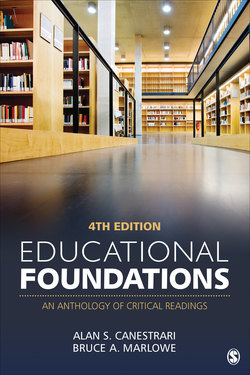Educational Foundations

Реклама. ООО «ЛитРес», ИНН: 7719571260.
Оглавление
Alan S. Canestrari. Educational Foundations
Educational Foundations
Educational Foundations
Contents
Preface
How Not to Use This Book
Acknowledgments
About the Editors
About the Contributors
Foreword
Reference
Part I Why Teach?
Chapter 1 My Need to Teach
References
Chapter 2 Why Teach?
Getting a Job
Chapter 3 Becoming a MISTER
Reference
Part II Who Are Today’s Students?
Chapter 4 Making the Most of the Classroom Mosaic A Constructivist Approach to Embracing Student Diversity
Introduction
Schools Are Changing, and They Are Changing Fast
Reframing Sexual Orientation
Reframing Cultural and Ethnic Differences
Reframing Disability
Disabilities and Academic Failure
Some Final Thoughts
References
Chapter 5 The Complexity of Labels Considering Refugee Youth in the United States
Unpacking Terms
Refugees in the United States and Beyond
Myths About Refugees
Myth 1: Refugees Are Dangerous or Terrorists
Myth 2: The United States Is Shouldering All the Burden
Myth 3: Refugees Don’t Contribute to Their Communities or Are a Drain on Resources
The Problem With Labels
References
Chapter 6 Translanguaging to Teach Toward Justice for Multilingual Students
Recognizing Our Students and Their Contexts
Who Are Today’s Multilingual Students?
What Are the Injustices Faced by Multilingual Students in U.S. Schools and Society?
Critiquing the Status Quo
What Practices Need to Be Critiqued? Labeling
Monolingual Ideology
English-Only Policies and Practices
How Can Translanguaging Serve as Critique?
Critiquing Labels
Critiquing Monolingual Ideology
Critiquing English-Only Policies and Practices
Teaching Practices
How Do I Embrace Translanguaging? Have a Compassionate Stance
Embrace the Translanguaging Corriente
Be Willing to Make Shifts in Your Teaching
How Do I Validate Students’ Identities? Connect to Students’ Funds of Knowledge
Use Identity Texts
How Do I Leverage My Students’ Languages Purposefully for Learning Content?
Make Languaging Central in Your Classroom
Use One Language as a Bridge to Learn Another
Structure Authentic Tasks That Encourage the Use of Multiple Languages
Pay Attention to Your Interactional Patterns
How Do I Make Sure That Languages Are Equitably Used in My Multilingual Classroom? The Use of Flexible vs. Focused Language Spaces
What if I Don’t Speak My Students’ Languages?
Does This Mean My Students Won’t Speak English?
Teaching Toward Justice for Multilingual Students
References
Descriptions of Images and Figures
Part III What Makes a Good Teacher? Vignette 1
Vignette 2
Chapter 7 On Stir-and-Serve Recipes for Teaching
Chapter 8 Psst . . . It Ain’t About the Tests It’s Still About Great Teaching
References
9 Rethinking Education as the Practice of Freedom Paulo Freire and the promise of critical pedagogy
Notes
References
Part IV What Do Good Schools Look Like?
Chapter 10 Lockdowns, Detectors, Guards, and Teachers With Guns?
References
Chapter 11 Success in East Harlem How One Group of Teachers Built a School That Works
What They Do and How They Do It
Time for Students
Time for Teachers
The Curriculum
Flexible Scheduling
Resources
Writing
Parent Conferences
Chapter 12 How, and How Not, to Improve the Schools
Notes
Part V How Should We Assess Student Learning?
Chapter 13 A Mania for Rubrics
Chapter 14 Grading The Issue Is Not How but Why?
Grading Rationale I: Sorting
Grading Rationale II: Motivation
Grading Rationale III: Feedback
Demand Vs. Support
Supportive Assessment
And If You Must Grade . .
References
Chapter 15 The Data Pandemic Rethinking the Supremacy of Measurement in Education
References
Part VI How Does One Develop a Critical Voice?
Chapter 16 Teachers as Transformative Intellectuals
Toward a Devaluing and Deskilling of Teacher Work
Teachers as Transformative Intellectuals
Notes
Chapter 17 Resistance and Courage A Conversation With Deborah Meier
Chapter 18 From Silence to Dissent Fostering Critical Voice in Teachers
References
Part VII How Do We Move Forward?
Chapter 19 Necessary Muddles Children’s Language Learning in the Classroom
References
Chapter 20 The 2018 Wave of Teacher Strikes A Turning Point for Our Schools?
What Is Driving the Teacher Rebellion?
Who’s Afraid of the Teachers?
Beyond the “Red States”: How Far Will the Revolt Spread?
Chapter 21 Teachers as Social Justice Warriors An Imperative for Meeting the Demands of the 21st Century
References
Epilogue The Quest Achieving Ideological Escape Velocity—Becoming an Activist Teacher
Where We Are
Where We Might Go
What We Might See
References
Index
Отрывок из книги
Fourth Edition
Paulo Freire, We Make the Road by Walking: Conversations on Education and Social Change
.....
We hope that new teachers will consider asking whether their instruction promotes the status quo. How deliberate are their efforts to promote equality and to include the experiences of traditionally marginalized groups in the curriculum? Is their instruction implemented at a transformational, social action level? New teachers need models of critical reflection (and even dissent) to help them develop their own critical questions and voices.
Like the previous editions, the major purpose of this fourth edition is to help teachers develop habits of critical reflection about schools and schooling before entering the classroom. It is for this reason that we continue to select authors with strong views that reflect these particular biases. We hope that these readings will offer a platform for discussion and debate that may be used by instructors to increase student knowledge of pedagogy and to provide authentic opportunities for potential teachers to think critically about teaching and learning. For example, we are very concerned about the current trend toward standardization of curriculum and instruction, a trend we believe devalues teaching and increases the distrust of teachers. We believe, like Deborah Meier, that this trend has manifested itself in schools organized around testing and that it is imperative for teachers to actively critique such events and recapture some of the control and power over their work.
.....